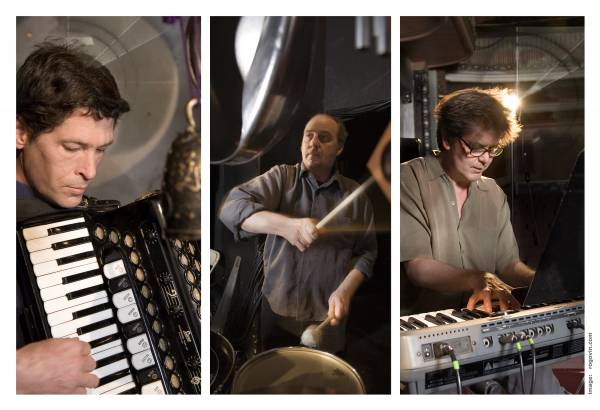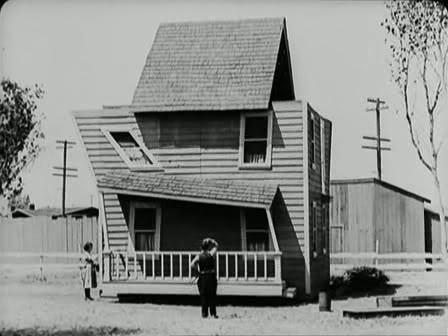
The Alloy Orchestra will play new scores for silent films at the World Financial Center this week (photo by Bruce Rogovin)
NEW SOUNDS LIVE SILENT FILM SERIES
World Financial Center Winter Garden
220 Vesey St.
February 2-4, free, 7:00
212-417-7050
www.wnyc.org
www.artsworldfinancialcenter.com
For nearly a quarter of a century, WNYC host John Schaefer has been presenting New Sounds Live, a series of live music events held in such locations as Merkin Concert Hall and the World Financial Center, featuring an eclectic lineup of musicians that has ranged from Ryuchi Sakamoto, Kitka, and David Hykes and the Harmonic Choir to One Ring Zero with authors Paul Auster, Siri Hustvedt, and Rick Moody. As part of the festival, Schaefer has been curating the New Sounds Live Silent Film Series, in which individuals or groups play live, original scores to silent classics in the WFC Winter Garden. Past years have paired the Club Foot Orchestra with THE PHANTOM OF THE OPERA (Rupert Julian, 1925), the Cinematic Orchestra with MAN WITH A MOVIE CAMERA (Dziga Vertov, 1929), the BQE Ensemble with THE GOLEM (Paul Wegener, 1920), and, last year, Lori Goldston, Wayne Horvitz, and Robin Holcomb with three Yasujio Ozu films. This year Schaefer has enlisted the Alloy Orchestra — keyboardist Roger Miller (Mission of Burma) with multi-instrumentalists Terry Donahue and Ken Winokur — to perform their scores to Buster Keaton’s ONE WEEK (1920), Fatty Arbuckle’s BACK STAGE (1919), and Charlie Chaplin’s EASY STREET (1917) on February 2, Harold Lloyd’s SPEEDY (1928) on February 3, and Douglas Fairbanks’s THE BLACK PIRATE (1926) on February 4. Schaefer discussed the series and more in the latest twi-ny talk.
twi-ny: How did you decide on the specific films that are included in this year’s New Sounds Live Silent Film Series program?

Buster Keaton’s 1920 classic ONE WEEK should bring the house down February 2 at the World Financial Center
John Schaefer: Well, there’s a lot to be said for the Principle of Restricted Choice. In this case, there were several things we wanted to do: One was a series of lighter works, more comic films than the Yasujiro Ozu movies we presented last year. And we also didn’t want to repeat films we’d shown before. Alloy has quite a film repertoire at its disposal, but we’ve worked with them several times over the years so there were a number of films we’d already done. The Harold Lloyd seemed a no-brainer, especially given its New York-centric storyline. And the score that Alloy did for that movie is smart and catchy — an important factor for a series that features live music. The Douglas Fairbanks film, probably best known for the scene where Fairbanks slides down a ship’s mainsail by holding on to a knife that is ripping into the fabric, is not a comedy but it is so over-the-top that you can hardly watch it without grinning — a quality reflected in Alloy’s score, by the way. And the collection of shorts gave us the opportunity to present three of the enduring geniuses of cinema comedy in one fell swoop. That’s what we’ll start the series with, on Wednesday the 2nd.
twi-ny: There are several piano players and groups that specialize in playing live to silent films. What does the Alloy Orchestra bring to these silent films that is different from other accompanists?
JS: The main thing they bring is their Rack of Junk — a ton (and I think I mean that literally) of percussive and other noise-making gear that augments the keyboards, clarinet, accordion, and other instruments that the three musicians also play. Also, this series of films with live music has always focused on music that does not sound like traditional movie-score material. Alloy doesn’t go in for “period pieces”; they create genuinely new music for these old films. As a result, the films seem less like period pieces themselves and more like a still-living art form.
twi-ny: You are the host of WNYC’s “New Sounds” and “Soundcheck,” for which you also write a blog nearly every day, covering a wide range of topics from across the musical spectrum. How has the internet changed the relationship between you and your listeners?
JS: The biggest change since the internet came along is to make communication with the listeners much easier. We get comments every day on “Soundcheck,” many of which we read on the air; “New Sounds” listeners can access web-only content; Facebook and Twitter allow us to keep our audience up to speed on live events (like these films), special guests, etc. And the ability to archive audio is a huge boost; especially with a show that isn’t in prime listening hours. Now, if you don’t want to stay up till midnight, you can still hear “New Sounds” — and hear it anytime you like. And even after all these years, I feel like the digital communication with our listeners is still growing up, unsure of what it’s eventually going to be. For example, we have a sizable treasure trove of videos of live in-studio performances on “Soundcheck,” and at some point we’re gonna figure out how best to organize these things in a way that allows people to easily find and use them. The internet has already made it so much easier to access information about the shows, the music, and more, but there are lots of other ways in which it can and will deepen the audience’s experience, and that’s a real major area of growth for us.